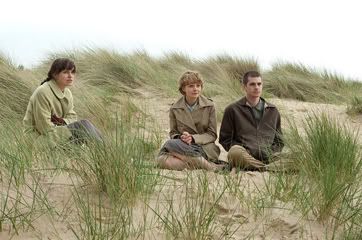

"Never Let Me Go" (2010)
In an alternate reality, advances in science and medicine have allowed the human race to live well past one hundred years old. This does not come without some sacrifices, though. Special schools have been established where children live, grow up and learn in their own isolated society within the larger one. The children are told they must stay healthy, that they are gifted and they are Donors. They live only to donate to others: kidneys, hearts, livers, other vital parts. Somewhere between one and four of their donations, they are complete, and their short lives come to an end.
While having the elements of science fiction, "Never Let Me Go" places them in the bleak reality of life in 70s, 80s and 90s England. This is a drama with an aching sadness as every scene is dripping with an intense melancholic mood that haunts and lingers with every gorgeously photographed shot thanks to Adam Kimmel's cinematography. As it is with dystopias, this one has parallels to our own world but what makes this one sting so profoundly is how real it feels.
There is an ominous air to Halshaim, the school where lifelong friends Kathy (Carey Mulligan), Ruth (Keira Knightley) and Tommy (Andrew Garfield) spend their childhood. Working as a British boarding school, the purpose of Halshaim is unclear at first, but slowly the mystery gets unveiled to not only us but the children, as well. They receive the harsh truth from a visiting guardian, Miss Lucy (the wonderful Sally Hawkins), who later gets removed from the school. The revelation that these children will never fully grow into adulthood is deeply unsettling knowing their lives will be over by the time they're in their 20s. Upon hearing this, however, the children also don't know any different; they're forced to accept their fate because it's all they are taught to understand.
The three friends grow up and move on to The Cottages, a new and more intimate living space where teenagers from other schools gather together. Between their time at Halshaim and here, a romance blossoms between Ruth and Tommy but much to Kathy's despair as she was originally interested in him. Ruth becomes the barrier to the true love between Kathy and Tommy, the love that had been there all along but was then interrupted by Ruth's selfishness. The trio's story goes on, parting ways and reuniting again, but their most important time together comes at this stage in their lives at The Cottages. Beyond this, they move again losing track of each other as Kathy, our narrator of the story, goes on to be a Carer for other Donors before she becomes one herself.
Adapted from Kazuo Ishiguro's 2005 novel of the same name, director Mark Romanek ("One Hour Photo") and screenwriter Alex Garland set Ishiguro's tale to an almost painfully somber and quiet tone accompanied by Rachel Portman's heartbreaking score. This is not a hindrance, though, and actually is beneficial to the disturbing and upsetting material. It is soulfully meditative, an elegantly fragile film that muses over not only death but the passing of life that cannot be avoided. The circumstances of these poor human beings within this miniature society of Donors is crucially devastating, a reflection of our own fears of love lost and lives taken too soon.
If you've seen Carey Mulligan in "An Education," you already know she is one of the finest young actresses working today. Likewise, "The Social Network" proved Andrew Garfield to be a stunning young actor. Put them together here, and their scenes are exquisite and emotional powerhouses. Their mesmerizing qualities are only exemplified by Keira Knightley who usually has center stage but here is effective as a supplement to their passion, her character who later wants to make amends for tearing the couple apart.
There is an old rumor at Halshaim that if two Donors were to fall in love, they can have their donations postponed. Tommy and Kathy are naturally in love but proving such love would be proving their humanity. How human can someone be who is mass produced as a product? Mass produced for one purpose, the purpose to allow others to live longer. And yet, are their lives any different than the ones they're being used toward saving and prolonging? It's so sorrowful to watch these characters. Their subdued nature seems almost necessary to cope. How else could you go on conscious of your own passing, knowing when it would be and for what reason, other than to have faith in letting go?





No comments:
Post a Comment